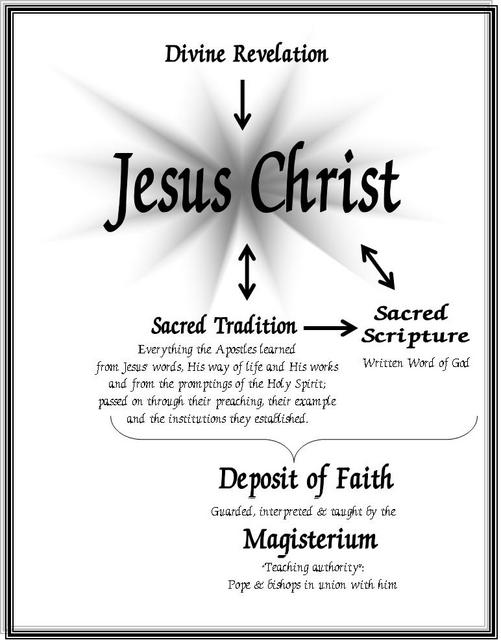kepha,
You stated: "Truth stands on its own merits or its (sic) not truth".
You miss the point. How do you and I determine it is truth? You accept the truthful authority of the Pope and RCC authority. I don't.
"authority of the Pope and RCC authority" doesn't invent or determine truth. That is a Protestant myth. God reveals truth to Jesus who reveals it to the Apostles and by default, to their successors. This is a divine pattern. There is an earthly authority clearly indicated in the Bible that sola scriptura constantly seeks to undermine.
I accept the Scripture as the final authority of truth because it is God-given (2 Tim 3:16-17)
First, 2 Tim 3:16-17 doesn't say Scripture is the final authority. In verse 14 Paul appeals to Tradition which alone demolishes sola scriptura. That's why verse 14 is ignored whenever you guys quote 2 Tm. 3.
2 Tim 3:14
But as for you, continue in what you have learned and have firmly believed,
(Tradition)
knowing from whom you learned it
(Magisterium)
[15] and how from childhood you have been acquainted with the sacred writings which are able to instruct you for salvation through faith in Christ Jesus.
(Scriptures)
[16] All scripture is inspired by God and profitable for teaching, for reproof, for correction, and for training in righteousness,
[17] that the man of God may be complete, equipped for every good work.
Note verse 14-15. It admonishes Timothy to do three things:
1) Remember what you have learned and firmly believed
(Tradition)
2) Know from whom you learned it
(Magisterium)
3) Know you have the
Scriptures
The Bible on St. Paul's list comes in third, not first. He actually gives here the traditional Catholic teaching on the three sources of sound teaching.
In verse 15 he goes into an excursus on the Bible. This brief excursus emphasizes the value of the Bible and recommends a fourfold method of exegesis. This verse was used in the pre-Reformation Church as a proof text for the Quadriga which was the standard Catholic approach to the Bible.
The Quadriga method used the following four categories:
Literal/Literary
(teaching) - the text as it is written
Analogical
(reproof) - matters of faith
Anagogical
(correction) - matters of hope/prophecy
Moral
(training in righteousness) - matters of charity
The analogical, anagogical and moral senses of the Bible were known collectively as the spiritual senses, still taught today.
The 'reformers' rejected the BIBLICAL fourfold method of exegesis in favor of a more literal approach,
and ignored 2 Tim 3:16!!!
2 Tim. 3:17 - Paul's reference to the "man of God" who may be complete refers to a clergyman, not a layman. It is an instruction to a bishop of the Church. So, although you use it to prove your case, the passage is not even relevant to most of the faithful.
Tim. 3:17 - further, Paul's use of the word "complete" for every good work is
"artios" which simply means the clergy is "suitable" or "fit." Also, artios does not describe the Scriptures, it describes the clergyman. So, you cannot use this verse to argue the Scriptures are complete.
James 1:4 - steadfastness also makes a man
"perfect (
teleioi) and
complete (holoklepoi), lacking nothing." This verse is important because "teleioi"and "holoklepoi" are much stronger words than "
artios," but Protestants do not argue that steadfastness is all one needs to be a Christian.
and emanates from God who is truth (Jn 14:6-7; Ps 86:11 ESV; 2 Cor 13:8) and He's the God who does not lie (Num 23:19; Heb 6:18).
None of these verses restricts the Word of God to scripture alone. In fact, scripture isn't even mentioned in any of these verses.
Relying on frail human opinion for truth is a recipe for disaster.
Where do you think sola scriptura came from? Is that why you are forced to re-write history? It didn't exist anywhere at any time until Martin Luther invented it. Relying on frail human opinion on formal sufficiency for truth is a recipe for disaster, as history clearly demonstrates.
Ephesians 4 Refutes the Protestant "Proof Text"
"All scripture is inspired by God and profitable for teaching, for reproof, for correction, and for training in righteousness, that the man of God may be complete, equipped for every good work" (2 Tim. 3:16–17).
This passage doesn’t teach formal sufficiency, which excludes a binding, authoritative role for Tradition and Church.
Protestants extrapolate onto the text what isn’t there. If we look at the overall context of this passage, we can see that Paul makes reference to oral Tradition
three times (cf. 2 Tim. 1:13–14; 2:2; 3:14). And to use an analogy, let’s examine a similar passage:
"And his gifts were that some should be apostles, some prophets, some evangelists, some pastors and teachers, to equip the saints for the work of ministry, for building up the body of Christ, until we all attain to the unity of the faith and of the knowledge of the Son of God, to mature manhood, to the measure of the stature of the fullness of Christ; so that we may no longer be children, tossed to and fro and carried about with every wind of doctrine, by the cunning of men, by their craftiness in deceitful wiles. Rather, speaking the truth in love, we are to grow up in every way into him who is the head, into Christ" (Eph. 4:11–15).
If 2 Timothy 3 proves the sole sufficiency of Scripture, then, by analogy, Ephesians 4 would likewise prove the sufficiency of pastors and teachers for the attainment of Christian perfection. In Ephesians 4, the Christian believer is equipped, built up, brought into unity and mature manhood, and even preserved from doctrinal confusion by means of the teaching function of the Church. This is a far stronger statement of the perfecting of the saints than 2 Timothy 3, yet it does not even mention Scripture.
So if all non-scriptural elements are excluded in 2 Timothy, then, by analogy, Scripture would logically have to be excluded in Ephesians. It is far more reasonable to recognize that the absence of one or more elements in one passage does not mean that they are nonexistent.
The Church and Scripture are both equally necessary and important for teaching.



